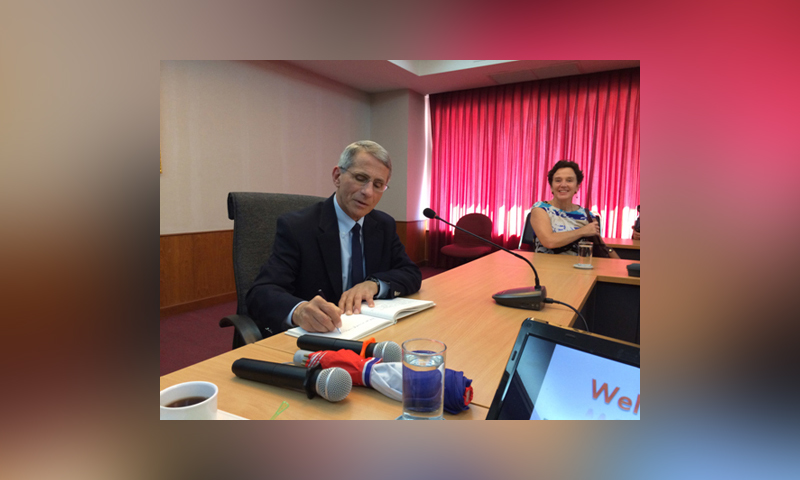
January 31, 2014, Dr Anthony Fauci visited the Thai Red Cross AIDS Research Centre, during his visit to Thailand as recipient of a Prince Mahidol Award Laureate in the Field of Medicine. In his role as Director of the National Institute of Allergy and Infectious Diseases (NIAID) since 1984, Dr Fauci oversees research relating to prevention and treatment of infectious diseases, including HIV, and has a particular interest in HIV cure research.
Since 2009, clients attending the Thai Red Cross AIDS Research Centre Anonymous clinic for HIV testing have had their blood screened with ultra-sensitive tests that can detect HIV within days of infection. Clients who’s test results indicate recent HIV infection, and have provided their contact details, are contacted immediately and started on antiretroviral therapy if they consent. These consenting patients, who are part of the SEARCH 010 study, have clinical staging criteria known as ‘Feibig Stages’ applied, to determine how recently the infection has occurred. Dr. Nittaya Phanuphak presented data showing that after several years of follow-up, subjects who start ART very early after infection have low levels of integrated DNA (1). The lowest levels are found in subjects who have HIV detected when they are at the earliest Feibig Stage. In the next phase of this project, some subjects will stop ART, or stop ART in combination either with broard-specific neutralizing monoclonal antibody or therapeutic vaccine, to determine whether they have achieved a functional cure; and Dr Fauci provided his expert advice on the proposed study design.
Professor Kiat Ruxrungtham presented in brief on studies that are currently funded by the US National Institutes of Health; and asked Associate Professor Thanyawee Puthanakit to describe the design of a NIH R01 granted study “Latent HIV reservoir in children”. It is a collaborative study between the Thai Red Cross AIDS Research Centre and the Thai Ministry of Public Health. The study protocol was based on preliminary results of a cross sectional study(2). Approximately 100 babies per year are born to mothers with HIV infection and do not receive treatment to prevent mother to child transmission of HIV, usually because the mother has never attended antenatal care. These babies will have ultrasensitive HIV testing at birth and every two months, and will also have ART initiated antenatally and continued until HIV infection is excluded. Those who have definitive HIV infection will continue treatment. Dr Fauci also discussed this study design, and noted the differences to the SEARCH 010 study, predominantly due of differences between the developing immune system of children compared to adults.
Dr Fauci gave his insights on the future of HIV prevention research, describing the potential for new therapies including monoclonal antibodies, strategies for improving HIV preventative vaccines based on previous studies which have demonstrated limited vaccine efficacy, and antiretroviral drugs with long half-lives which perhaps could be taken on a monthly basis as a strategy for PrEP. Finally, Dr Fauci described that the support of Country leaders are pivotal in efforts to reduce stigma associated with HIV infection.
(1) Ananworanich J, Schuetz A, Vandergeeten C, Sereti I, de Souza M, Rerknimitr R, Dewar R, Marovich M, van Griensven F, Sekaly R, Pinyakorn S, Phanuphak N, Trichavaroj R, Rutvisuttinunt W, Chomchey N, Paris R, Peel S, Valcour V, Maldarelli F, Chomont N, Michael N, Phanuphak P, Kim JH, Group RSS. 2012. Impact of multi-targeted antiretroviral treatment on gut T cell depletion and HIV reservoir seeding during acute HIV infection. PloS one 7:e33948.
(2) Ananworanich J, Puthanakit T, Suntarattiwong P, Chokephaibulkit K, Kerr SJ, Fromentin R, Bakeman W, Intasan J, Mahanontharit A, Sirivichayakul S, Chomont N. 2013. Reduced markers of HIV persistence and restricted HIV-specific immune responses after early antiretroviral therapy in children. AIDS (In Press).


